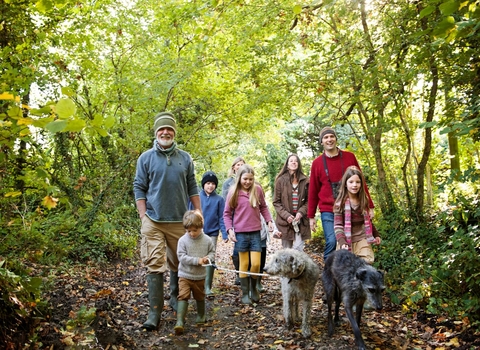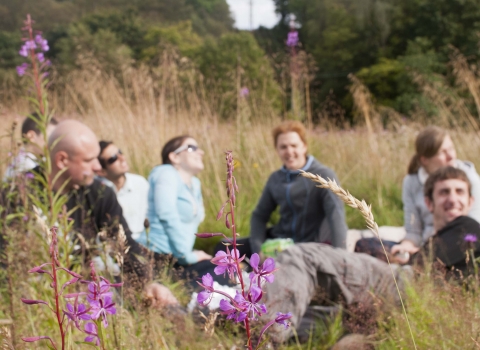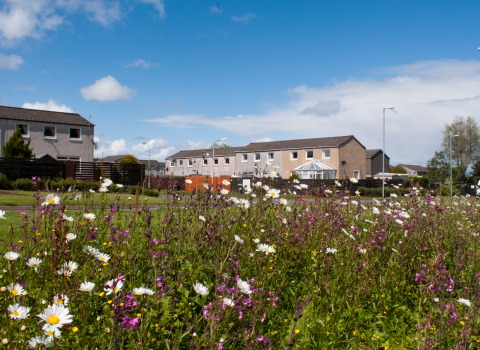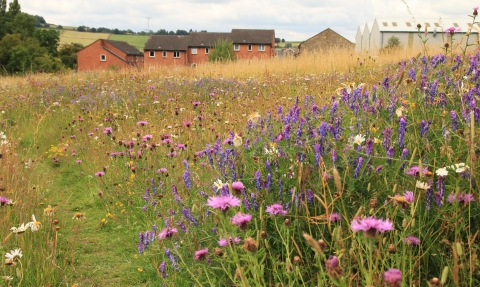
Meadows and houses by Kieron Huston
Natural capital
Everything we value comes from nature.
Nature underpins everything we do. We need healthy soil to grow food in, fresh air to breathe, clean water to drink, and green space for exercise and relaxation. In spite of this, nature is often undervalued and overlooked in favour of short term financial gains.
We believe we cannot go on like this. There is an urgent need for society to gain a better understanding of the cost of our impact on the world's rapidly diminishing natural resources. By recognising the economic value of the things that nature provides us with, we can better protect and restore these precious assets before it is too late.
When we assess the economic value of the resources nature provides, we call them ‘natural capital’. These assets are extremely valuable - the UK's nature, landscapes and waterways and the services and benefits they provide are worth almost £1 trillion to the UK economy (according to the Office of National Statistics).
A rapidly growing number of business and political leaders are recognising that we rely on this natural capital – the world’s natural resources such as water, forests and fish stocks – to provide goods and services vital to economic activity and human well-being (including food, carbon storage and natural flood defences). However, we are depleting this natural capital at an unprecedented rate and action is urgently needed.
Find out what BBOWT is doing to protect, restore and advocate for natural capital.
What is natural capital?
Natural capital is the world’s stocks of natural assets which include geology, soil, air, water and all living things. It is from this natural capital that humans derive a wide range of services, often called ecosystem services, which make human life possible, such as provision of food, carbon storage and natural flood defences.
Natural capital is a concept that is becoming increasingly relevant to environmental work, both here in the UK and globally. The government’s 25 year plan for the environment offers new policies that recognise the monetary value of the natural environment and the services that it gives us every day.
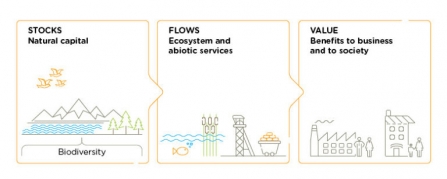
Natural capital is a stock, and from it flows ecosystem services. These services can provide economic, social, environmental, cultural, or spiritual benefits, and the value of these benefits can be understood in qualitative or quantitative (including economic) terms. Graphic by Natural Capital Coalition.
What are ecosystem services?
Ecosystem services are all the benefits that humans gain from the natural environment and from properly functioning ecosystems. The University of Reading produced four films about the four main aspects of ecosystem services. Click the links below to watch them.
Nature enhances lives: ‘cultural services’ explained
Nature’s assets: ‘natural capital’ explained
How can natural capital help us protect wildlife and the environment?
Natural capital and the ecosystem services it provides is a concept that can help ensure that the true value of the environment is more easily factored into public and private decisions (for example, government planning & economic decisions, and business non-financial accounting & sustainability decisions).
At BBOWT we believe that natural capital is an important lens with which to view the environment and communicate its importance with public and private decision-makers. Natural capital is not about 'putting a price on nature'. It goes hand in hand with more traditional approaches used in conservation and ecology that we use to protect the environment, and can help us motivate new audiences to be environmentally responsible.
What is at stake if we don't recognise nature's value?
Damage to our natural systems is costing us dearly.
For example, the cost of flooding (which we pay for through higher insurance premiums) and for cleaning water pollution (which we pay for through our water bills) was recently calculated by the Green Alliance at £2.4bn a year in England.
It has been too easy to take the environment for granted, and now we can no longer afford to keep on taking from nature without giving back.
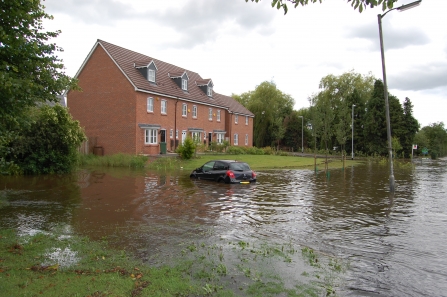
Our natural environment offers one of the best defences against climate change - it is vital that we properly value it. Photo by Scott Petrek.
Nature has the solutions
The UK's nature, landscapes and waterways and the services and benefits they provide are worth almost £1 trillion to the UK economy (according to the Office of National Statistics). For example, on hot days in 2017, the cooling effect of trees and bodies of water helped to save the UK £248m by maintaining productivity and lowering air conditioning costs.
Investment in natural capital is essential for sustainable business and there is an urgent need to tackle climate change, reduce pollution, manage flood risk and build stronger, more sustainable natural resources.
Natural capital can help protect us from climate change
Nature-based solutions are proven ways of storing and reducing carbon emissions in the world’s forests, grasslands and wetlands, and better stewardship of the land also has other critical environmental, social and economic benefits. These solutions are available immediately, are scalable and can transform key sectors of the global economy, such as forestry and agriculture.
What is BBOWT doing to protect, restore and advocate for natural capital?
The conservation work that we do helps increase the quality and quantity of habitats, like Chilterns beechwoods at Warburg Nature Reserve, the floodplain meadows of Iffley Meadows, the heathland of Wildmoor Heath, and the wetlands of the upper River Ray. These in turn help improve natural capital assets like soil, water and wildlife, which in turn provide services like carbon storage, water and air quality improvements, pollination for food, recreation and health values, and increases in diversity of wildlife.
-
By protecting and restoring wildlife on our nature reserves, we are in turn protecting natural capital.
- Our work in the wider countryside with other landowners, like farmers, is designed to help enhance natural capital assets and benefits - such as improved soils, cleaner water, enhanced biodiversity, and more sustainable food production. 83% of Oxfordshire’s landscape is farmed. We need the food that the farmers produce, but we also rely on biodiversity to produce that food, healthy soils and farm margins rich in vegetation keep our water clean, and to help draw down carbon. Our work in the countryside with landowners is designed to help enhance natural capital assets and benefits such as improved soils, cleaner water, enhanced wildlife, and more sustainable food production.
- We are a member of the Natural Capital Coalition, an international collaboration that unites the global natural capital community. By joining the coalition, we join almost 300 organisations who share a common belief that we can do more together than we can alone in helping the value of natural capital be recognised by all parts of society.
- When major developments are planned in our three counties, we are standing up for wildlife - for example, we sit on groups that make up the OxCam Arc Local Natural Capital Plan (LNCP), which aims to generate environmental investment to create greener, healthier and more productive communities across the area.
A local example of nature's value: Chimney Meadows nature reserve
We've studied the economic value of Chimney Meadows in Oxfordshire, one of our largest nature reserves, to assess the public benefits that come from this land, which is now managed for the natural environment instead of conventional agriculture.
The results are astonishing: Chimney Meadows as a nature reserve has four times as much value to the public than if it was a conventional farm.
Our conservation management of Chimney Meadows has included the reversion of arable to species-rich grassland, restoration of wet grassland and swamp, extension of woodland, and the planting and restoration of hedgerows. When you compare this to intensive agricultural management that was practiced in the past, we will generate far greater local benefits, which include flood, climate and water quality regulation, health and recreation benefits, and increased wild species diversity.
You can read more about Chimney Meadows in this report, which should be of particular interest to anyone making local and regional policies for development, infrastructure and health.
Get involved
If you would like more information on natural capital, get in touch and we can advise you on how you can make natural capital a part of your organisation.
Stay up-to-date with our work
Sign up below to receive the latest news from BBOWT, tips about how you can help wildlife, plus information on how you can get involved.
Find out more
Find news updates and information about BBOWT's campaigns.



